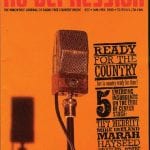Field Reportings from Issue #25
MUSCLE SHOALS SYMPOSIUM: On November 13, the University of North Alabama in Florence hosted a symposium titled “Muscle Shoals Sounds: The Rhythm Of The River” that examined the musical history of the Muscle Shoals area. Muscle Shoals began its ascent into the world’s musical consciousness during the 1960s Southern soul boom when artists such as Wilson Pickett, Aretha Franklin and the Staple Singers recorded there. In the ’70s and ’80s, many mainstream rock acts (Rolling Stones, Bob Dylan, Paul Simon) recorded hits of their own in the small river community. The Shoals also gave career jump-starts to several of their own former session players, including Duane Allman.
Although today’s musical community in Muscle Shoals centers mainly on Nashville-oriented songwriting rather than recording, the symposium showed that the area still has a sense of its own roots. Those appearing at the event, many of whom still reside in the area, included the soul writing duo of Dan Penn and Spooner Oldham, soul singers Clarence Carter and Jimmy Hughes, and the renowned Muscle Shoals Rhythm Section (Jimmy Johnson, Roger Hawkins, David Hood and Barry Beckett).
The symposium ended with a historical panel that included Rick Hall, founder of FAME, the first Muscle Shoals studio to receive national exposure; Buddy Killen, an area native who went on to found the publishing giant Tree International; Sun Records founder and area native Sam Phillips; and Jerry Wexler, the Atlantic Records executive and producer who exposed Muscle Shoals to the world.
The symposium provided an impressive coda for an excellent series of articles about the history of Muscle Shoals music that had recently appeared in TimesDaily, one of the area’s local newspapers. The series can be accessed through the publication’s website: www.timesdaily.com
WITHER I’M A WHISKEY: The dissolution of Outpost Records in the final weeks of 1999 has thrown the release of Whiskeytown’s third album, tentatively titled Go Bye-Bye Music, into music-biz purgatory. The album, which was recorded last summer with drummer/multi-instrumentalist Ethan Johns producing and Outpost partner Scott Litt mixing, has been ready to go for months, but Outpost’s relationship with parent-company Geffen fizzled after Geffen was basically phased out of existence in the wake of the Universal/Polygram merger. The Whiskeytown record may well resurface on another label before long, pending the efforts of Outpost honcho Mark Williams to find a suitable home for it. Meanwhile, lead singer Ryan Adams has been biding the down-time with a solo project. He toured the Southeast on his own for a couple weeks in late October, performing new material that he’s tentatively planning to record in England in January with renowned producer Glyn Johns (father of the aforementioned Ethan). Whiskeytown fiddler Caitlin Cary reportedly has been working on a solo project as well.
BILLY WOODY WILCO: Billy Bragg and Wilco are planning to reconvene for another round of collaborations involving additional unpublished lyrics by legendary songwriter Woody Guthrie. Previous reports had suggested there were enough outtakes from Mermaid Avenue, the 1998 album of Guthrie songs set to music written by Bragg and Wilco, to assemble a follow-up album. In a November interview with Canadian journalist Paul Cantin of JamShowbiz.com, Wilco’s Jay Bennett said there are some outtakes worth revisiting, but that the musicians also plan to record some new material, and in fact spent time this fall perusing Guthrie’s archives in New York to gather more songs to work on.
TOWNES TUNES: A new album by folk veteran Eric Andersen, due out on Appleseed in early 2000, features four songs Andersen co-wrote with Townes Van Zandt in 1986. Van Zandt, who died in 1997, rarely co-wrote with anyone; perhaps the only other known example is “Mister, Can’t You See”, which is credited to Van Zandt and Mickey Newbury on Newbury’s 1968 album Harlequin Melodies. Andersen told journalist Kevin Raub of Allstar.com that the songs — titled “The Meadowlark”, “The Road”, “The Blue March” and “Night Train” — had been missing for 13 years but turned up recently in the possession of some friends in New Mexico.
ALL THE FIXINS: A photo caption on page 61 of ND #24 (Nov.-Dec. ’99) accompanying the cover story on Dolly Parton incorrectly identified the bassist as Barney Bales; his first name is Barry. Also, the article referred to backing vocals on Parton’s record by Rhonda and Darren Vincent but incorrectly identified them and husband and wife; they are siblings….
An article on Michael Hurley in ND #24 incorrectly stated that Hurley’s debut disc First Songs was released in 1965; it came out in 1964. Elsewhere, the article implied that Hurley’s Armchairboogie album was released in 1971; it came out in 1970….
In ND #23 (Sept.-Oct. ’99), an obituary on Anita Carter misspelled the name of her hometown as Maces Springs, Virginia. It’s properly spelled Maces Spring. Also, her father was referred to as “Eck”; his proper first name was Ezra.




